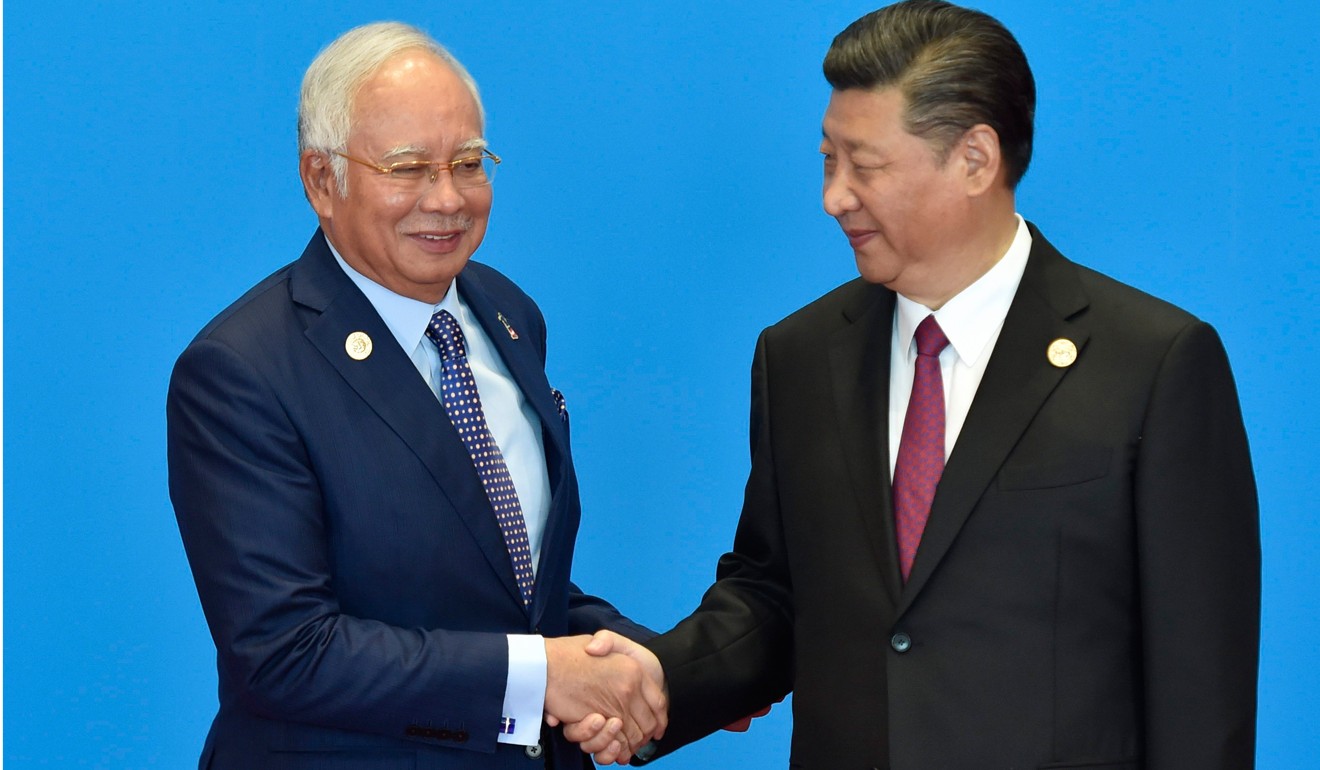While such a large service has the effect of buttressing the government, making Malaysia more stable, it also hampers efforts to transform the government, making Malaysia more stagnant too.
So while Mohammad’s desire to reduce the size of the civil service is quite understandable – indeed, it may even be necessary to prevent a government financial meltdown – Prime Minister Najib Razak knows that doing so would be the kiss of death politically, given the impending general election.
Thus Najib has taken to reassuring the civil service, which is predominantly formed of Malays, not to worry about any reduction in headcount. The can has been kicked down the road.
Najib’s take on Malaysia’s new MRT risks upsetting Chinese
It should be noted that Mohammad’s figure of 1.6 million includes armed forces, police, education and hospital personnel. The Congress of Unions of Employees in the Public and Civil Services (Cuepacs) claims that these should not be included in the headcount, as is the case in some other countries, and consequently claims the civil service numbers 500,000. Even so, there is a self-serving logic to Cuepacs’ suggestion – they don’t want their heads to roll.
 Government employees such as the police are key to electoral success in Malaysia. Photo: AFP
Government employees such as the police are key to electoral success in Malaysia. Photo: AFP
However the headcount is made, the fact is the Malaysian civil service is a behemoth, one of the largest in the world.
In February 2017, the deputy finance minister, Abang Johari, warned the annual payroll was already at US$19 billion while pension payments were US$4.5 billion a year.
There is one civil servant for every 19.37 people in Malaysia, according to Johari, as opposed to 1 to 71.4 in Singapore; 1 to 110 in Indonesia; 1 to 50 in South Korea; 1 to 108 in China; 1 to 28 in Japan; 1 to 84 in Russia; and 1 to 118 in Britain.
The bloated size of Malaysia’s service causes government expenditure to rise yearly and create a government that is unwieldy and bulky.
While opposition parties like the Democratic Action Party (DAP) have voiced concern over the size of the civil service before, not even they are prepared to address the issue head on as they too are scared to lose votes. Ninety per cent of Malaysia’s civil servants are ethnic Malays.
An election like none other, is it time for change in Malaysia?
This is the demographic that the DAP and the opposition coalition have been targeting in their bid to beat Najib in the upcoming general election.
Liew Ching Tong, one of the top strategists in the DAP, believes that if the Malay votes were to dip by 15 per cent – a distinct possibility – the opposition would gain another 34 seats in parliament. This would immediately deny Najib a simple majority of 112 seats.
Given the General Election is looming – it must be called by the middle of next year – the bloated nature of the civil service has been left largely uncommented upon.
 Hospital staff in Kuala Lumpur. Malaysia has 1.6 million civil servants, if hospital staff, police and armed services are included in the headcount. Photo: AFP
Hospital staff in Kuala Lumpur. Malaysia has 1.6 million civil servants, if hospital staff, police and armed services are included in the headcount. Photo: AFP
Yet, in spite of the pliant nature of the Malaysian government under Najib, there are tell tale signs that the civil service may throw their lot to the opposition anyway. These votes may well come from the armed forces and police, whose welfare and salaries remain stagnant.
Leaks against the Najib government have turned from a trickle to a torrent over the last five years.
And the Malaysian police, which has in the past appeared happy to crack down on the opposition, has begun to turn a blind eye.
Rais Hussin, the top strategist of Bersatu, which is the party of former premier Dr Mahathir Mohamad, told The Malaysian Insight that “silent support of the opposition is gaining”.
He said Malaysian civil servants were pro-Bersatu but would not declare their support openly. However, they would vote out Najib’s Umno (United Malays National Organisation) party on a secret ballot.
Can China really deliver Malaysia’s Singapore slayer?
Rais may well have a point, as the government servants fear being dismissed from their jobs.
The key question facing Najib now is fiscal management. How does he continue to pay the government employees and their pensions?
Government coffers are fast diminishing – on July 31, state investment fund 1MDB failed to make a reimbursement of US$650 million to Ipic, a sovereign wealth fund in Dubai that has lent 1MDB nearly US$6.4 billion in two loans it now wants serviced.
Najib can borrow from local banks to tide him over, but if he does this it will have the effect of “crowding out” other genuine borrowers, and the interest rate would spike.
This would lead to a vicious cycle in the economy and prompt living costs to rise.
Thus Najib is trapped. His only political lifeline is the Malaysian civil service.
If he can retain their support, and continue to attract large amounts of foreign direct investment from China, he can cling to power.
 Malaysian Prime Minister Najib Razak with Chinese President Xi Jinping. Najib must continue to court Chinese investment if he is to cling to power. Photo: AFP
Malaysian Prime Minister Najib Razak with Chinese President Xi Jinping. Najib must continue to court Chinese investment if he is to cling to power. Photo: AFP
But first Malaysia must find a way around Beijing’s restrictions on how the money is spent – otherwise investments from China will cater only to Belt and Road Initiative projects.
Such a play would not be without risk, as the opposition has pointed out. If Malaysia keeps taking money from China without looking at the merits of the projects the cash is spent on, Malaysia risks becoming another Sri Lanka – which has a port managed and controlled wholly by the Chinese due to the island’s inability to repay its debt.
Why are Chinese moving to Malaysia by the thousands?
The opposition has argued, not without merit, that Malaysia under Najib stands at the precipice of just such a state of affairs if it takes a pro-China approach to the exclusion of all other investment and fiscal options provided by the international markets.
But with the albatross of 1MDB hanging on Najib’s neck – he denies being linked to a scandal at the fund in which investigators traced US$700 million into a private bank account – even the option of going global has become problematic.
RELATE
Pay outs and bonuses for the Malay civil service could yet turn the situation around, but doing so would incur even greater domestic and foreign debt. -scmp.com



Pertama saya ingin menyapa para pengunjung situs ini dengan kata assalamu alaikum warohmatullahi wabarokatu, salam sejahtera, salam saudara saudaraku perkenalkan nama saya IBU HASTUTI seorang mantan BMI duluh kerja di HONGKONG kali ini saya akan menulis postingan tentang PESUGIHAN UANG GAIB. Jika kita membahas informasi tentang PESUGIHAN UANG GAIB sebenarnya sudah banyak iklan iklan ahli spesialis pakar pesugihan yang bisa menarik uang gaib dalam waktu singkat yang beredar di internet, namun perlu kami tegaskan kepada anda supaya lebih hati hati dalam memilih iklan pesugihan lewat internet termasuk media sosial jenis facebook dan twitter karna sya sudah di tipu oleh iklan tersebut. Saya juga tidak mengharapkan anda untuk lebih memilih melakukan pesugihan malalui orang yang sudah membantu saya akan tetapi anda bisa menilainya sendiri kira kira jasa pesugihan mana yang paling tepat untuk dijadikan solusi kaya raya. Saya ingin mengucapkan banyak terimah kasih kepada MBAH Giwangkara atas bantuannya selama ini dan saya tidak menyangka kalau saya sudah bisa sukses dan ini semua berkat bantuan beliau selama ini, Saya yang dulunya bukan siapa-siapa bahkan saya juga selalu dihina orang2 dan alhamdulillah kini sekarang saya sudah punya usaha jual alat bangunan sendiri itu semua atas bantuan beliau.Saya sangat berterimakasih banyak kepada MBAH Gawangkara atas bantuan PESUGIHAN UANG GAIB nya, Saya yang dulunya pakum karna masalah faktor ekonomi dan kini kami sekeluarga sudah sangat serba berkecukupan,, Bagi anda yang punya masalah keuangan jangan ragu/maluh untuk menghubungi MBAH Giwangkara karna beliau akan membantu semua masalah anda dan baru kali ini juga saya mendaptkan para normal yang sangat hebat dan benar-benar terbukti nyata, Ini bukan hanya sekedar cerita atau rekayasa tapi inilah kisah nyata yang benar-benar nyata dari saya dan bagi anda yg butuh bantuan beliau silahkan hubungi di +62852 1966 8513 semoga dengan adaNya pesan singkat ini sodarah bisa sukses seperti saya...
ReplyDeleteWassalam...